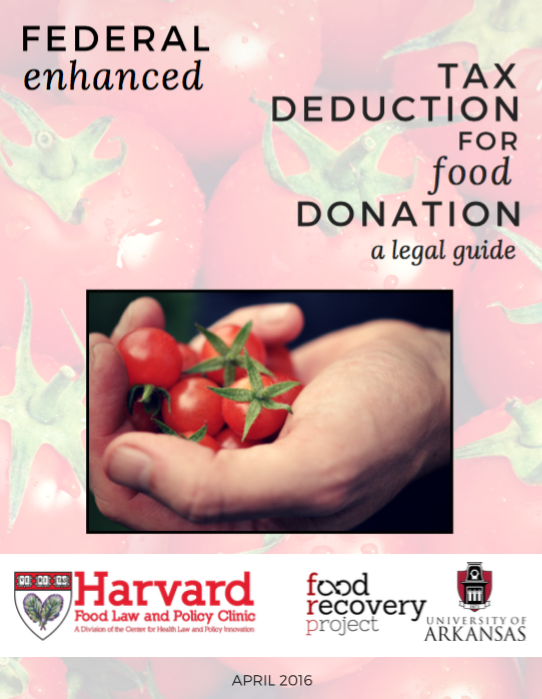 The Harvard Food Law and Policy Clinic, in partnership with the Food Recovery Project at the University of Arkansas, is pleased to published an updated version of “Federal Enhanced Tax Deduction for Food Donation: A Legal Guide,” to reflect the significant changes Congress made as part of the fiscal year 2016 omnibus budget that increase tax incentives for food donations and prevent food waste. This guide, originally published in November 2015, provides an important resource for food businesses and food recovery organizations to determine whether a food donor is eligible to receive the enhanced deduction.
The Harvard Food Law and Policy Clinic, in partnership with the Food Recovery Project at the University of Arkansas, is pleased to published an updated version of “Federal Enhanced Tax Deduction for Food Donation: A Legal Guide,” to reflect the significant changes Congress made as part of the fiscal year 2016 omnibus budget that increase tax incentives for food donations and prevent food waste. This guide, originally published in November 2015, provides an important resource for food businesses and food recovery organizations to determine whether a food donor is eligible to receive the enhanced deduction.
An estimated 40 percent of food produced in the United States goes uneaten; at the same time, more than 14 percent of U.S. households are food insecure at some point during the year. Diverting a fraction of the wholesome food that currently goes to waste in this country could effectively end food insecurity for all Americans.
The extension and modification of the charitable deduction for contributions of food inventory included in the 2016 omnibus budget contains four significant changes: 1) a permanent extension of the enhanced tax deduction for food donations; 2) increases the deduction’s cap to 15% of the donor’s net income; 3) provides certain taxpayers a new optional formula for calculating the enhanced deduction; and 4) provides a formula for determining the fair market value (FMV) of food inventory. Each of these are reflected in the updated legal guide and explained in detail in FLPC’s previous blog post.
Given the significant negative impacts of wasting food, more food businesses should consider donating their excess, wholesome food. This guide hopes to encourage more food donation by shedding light on how the federal enhanced tax deduction makes food donation a more financially feasible practice for certain businesses, and what businesses need to do to be eligible for this enhanced deduction.
FLPC is also working on a policy paper that details various recommendations for the federal government to utilize policy change to encourage more donations of healthy, wholesome foods, including expanding and upgrading this enhanced tax deduction. In addition, FLPC will publish a food recovery toolkit targeting state and local changes to increase food recovery, such as effective options for state-level tax incentives to further support food donation. Look for these two publications in spring/summer 2016!


Health Law & Policy, Commentary
Braidwood Management v. Becerra: Updated FAQs for Health Advocates and Providers
July 22, 2024